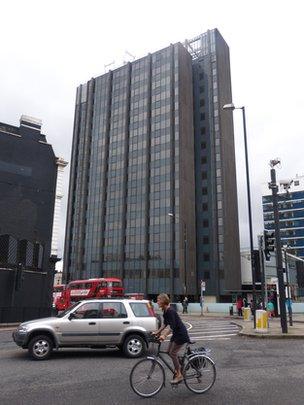The new landlords: How you could soon pay rent to a brand
- Published

The new flats are designed to keep tenants happy - and make them stay longer
Leaky pipes, broken boilers and sudden evictions are routine hazards for Britain's nine million private tenants.
Most landlords are perfectly decent, of course, but many tenants dream of a world where renting is altogether less hassle.
That other world is about to arrive in the UK.
Corporate renting - where the landlord is a company, not an individual - has been long-established in the United States.
Now, backed by cash from US pension funds, one UK company is planning to offer 5,000 corporate flats for rent in London alone.
It is claiming to be the first to do so on such a scale.
So will this change the rental landscape, or will most tenants find the concept unaffordable?
Happy
"Getting rid of bed-bugs can be a problem with tenants - so the rooms are designed to be steam-cleaned," says Ian Merrick, the operations director of Essential Living, as he gives me a glimpse of what the first flats may look like.
We are on the top floor of Archway Tower in north London, which will eventually offer 118 apartments to tenants.

118 flats will be built for rent at Archway Tower in north London
Even though it is two years before the residents will move in, fresh lemons and bottles of designer olive oil are already in place, together with a Jamie Oliver on the bookshelf.
This brand is already an expert in rental chic.
And everything about the apartments has been designed to encourage tenants to stay for several years, rather than the 18 months which is typical.
"If they stay, we've made hundreds of thousands of pounds," says Ian.
"If I could get them to three or four years, I'm laughing," he adds.
He is also doing everything he can to keep costs down. That includes adjusting the bevel on the skirting board, so they can be cleaned with just a flick of a feather duster.
The company will also change all the light bulbs itself. It is apparently cheaper than giving the responsibility to tenants, who are prone to breaking them.
'Asked to leave'
On the face of it, there are many advantages to renting from a company. For example:
The landlord is not going to put the property up for sale, forcing the tenant to move out
There is no letting agent involved, saving on extra fees
Contracts and rent increases should be transparent
There are professional health and safety standards, such as smoke detectors and fire alarms
If something goes wrong, like the boiler, the concierge will get it fixed
As long as tenants pay the rent, they can stay as long as they like

Renting from a company could be really attractive, says tenant Venice Allan
That last idea sounds particularly inviting to renters who have had bad experiences with landlords.
Venice Allan complained once too often about a faulty boiler and exposed electrical wires, and was then given her notice on Christmas Eve.
A corporate landlord might offer her greater security.
"You're not going to be asked to leave," she says.
"If you pay your rent on time as a good tenant, there's going to be no reason why you couldn't stay there indefinitely. That's really attractive," she adds.
'High end'
But some tenants' groups are sceptical about Essential Living's plans.
Generation Rent, which used to be known as The National Private Tenants Organisation, believes the flats will be too expensive for most ordinary earners, like teachers or nurses.
"I'm sure I'd like to live there myself," says Generation Rent's Alex Hilton.
"But the fact is I won't be able to afford to live in the Essential Living development in Archway - or any of their proposed developments," he says.
Essential Living says it has not yet worked out what it will charge by the time the flats are let in 2016.
But it rejects the accusation that it is aimed only at wealthy tenants.
"We're not high-end, luxury. That's a small sector of the market," says Ian Merrick.
"We want to be that middle tranche. So we're not going for the top end."
When questioned about whether a nurse at the nearby Whittington hospital might ever afford to rent one of the properties, Mr Merrick says there's no reason why not - if done jointly with a partner.

The Essential Living brand is already an expert in rental chic
Logic
So will this change the rental landscape in the UK?
The truth is this will depend on scale, as well as price.
Hundreds of other companies would need to come on board, and corporate renting will need to prove as profitable in other UK cities as it is likely to be in London.
But UK pension funds are keen on the idea, as the business provides a steady stream of income for years to come.
And the model has a curious and fascinating logic behind it - make tenants happy, and the cash will come rolling in. That has got to be good for tenants, as well as investors.